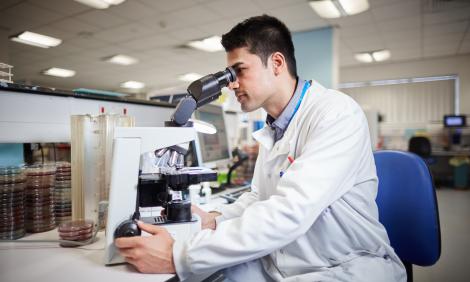Cancer genomics
Genes are instructions which tell the body how to make all the proteins it needs to survive and grow. Cancer genomics is the study of genes and how alterations in genes can lead to changes in cells which cause cancer.
Overview
DNA (deoxyribonucleic acid), is the hereditary material in humans and almost all other organisms. DNA spells out genes which are instructions which tell the body to make all the proteins it needs to survive and grow.
Working in cancer genomics, you would be responsible for identifying different types of cancer which are caused by alterations in genes.
Working Life
You would use chemical examination of cellular DNA to define genetic changes and the majority of your work would revolve around;
- examination of DNA to identify if and what type of cancer a patient may have
- working with other healthcare scientists and doctors to provide a diagnosis for patients
- work with other healthcare scientists and doctors to find the best treatment for a patients, and check how well that treatment is working
As a healthcare scientist working in cancer genomics, you’d rarely have direct patient contact yourself, but you would be very aware of the impact that your research and examinations have on patients.
Who would I work with?
You would work as part of a multidisciplinary team that includes doctors specialising in pathology, cancer, genetics and genomics, healthcare science staff specialising in bioinformatics genomics, specialist nurses and genomic counsellors.
Want to learn more?
-
Most jobs in the NHS are covered by the Agenda for change (AfC) pay scales. This pay system covers all staff except doctors, dentist and the most senior managers. If you work in healthcare science, specialising in cancer genomics, your salary will typically be between AfC bands 5 and 9, depending on your precise role and level of responsibility. As a healthcare science practitioner, you’d usually start on band 5, with opportunities to progress to more senior positions. Trainee clinical scientists train at band 6 level, and qualified clinical scientists are generally appointed at band 7. With experience and further qualifications, including HSST training, you could apply for posts up to band 9.
NHS staff usually work a standard 37.5 hours per week. They may work a shift pattern.
Terms and conditions of service can vary for employers outside the NHS.
-
With further training or experience or both, you may be able to develop your career further and apply for vacancies in areas such as further specialisation, management, research, or teaching.
Healthcare science staff often work at the forefront of research and innovation, so that patients are continually receiving the very best healthcare. For example, in genetics you could be involved in the 100,000 Genomics project - a project that aims to gain better understanding of how certain medical conditions with a genetic component affect us.
-
Genomics is an expanding area of healthcare science. The 100,000 Genomics project is one example of how opportunities are being created to understand more about our genetic make-up and to predict how our health may change in the future. It can be advantageous to have gained some experience of working in a relevant environment before applying for a place on a course or job vacancy. You should always check with the course provider or employer to see what sort of experience is preferred or required.
In November 2018, there were 6,123 clinical scientists registered with the Health and Care Professions Council.
Finding and applying for jobs
When you’re looking for job or apprenticeship vacancies, there are a number of sources you can use, depending on the type of work you’re seeking.
Check vacancies carefully to be sure you can meet the requirements of the person specification before applying and to find out what the application process is. You may need to apply online or send a CV for example.
For the NHS Scientist Training Programme (STP) and Higher Specialist Scientist Training (HSST), there is an annual recruitment cycle. Applications usually open in early January for the intake in the following autumn and should be made through the National School of Healthcare Science website, where you can also find information about the programme and the recruitment process. The STP and HSST attract many more applicants than there are places and so there is considerable competition for places.
Key sources relevant to job vacancies in the health sector:
- Vacancies in organisations delivering NHS healthcare can be found on the NHS Jobs website
- Vacancies in local government can be found on the Local Government Jobs website and the Jobs Go Public website
As well as these sources, you may find suitable vacancies in the health sector by contacting local employers directly, searching in local newspapers and by using the Universal Jobmatch tool.
Find out more about applications and interviews.
Volunteering is an excellent way of gaining experience (especially if you don’t have enough for a specific paid job you’re interested in) and also seeing whether you’re suited to a particular type of work. It’s also a great way to boost your confidence and you can give something back to the community.
-
For further information about working and training in cancer genomics, please contact;





